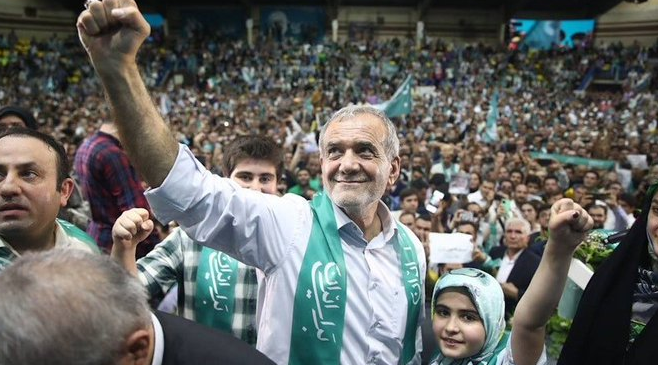Iranian reformist candidate Masoud Pezeshkian secured victory in the presidential runoff election, prevailing over ultraconservative opponent Saeed Jalili, as reported by state media on Saturday. The interior ministry released results indicating Pezeshkian gathered over 16 million votes, surpassing Jalili’s tally of more than 13 million from more than 30 million votes counted so far.
Pezeshkian, a prominent heart surgeon and seasoned lawmaker, campaigned on promises to improve relations with Western nations and relax enforcement of Iran’s mandatory headscarf law amid years of economic sanctions and internal protests challenging the Islamic Republic’s policies.
Celebrations erupted in Tehran and other cities as Pezeshkian’s lead solidified throughout the night, marking a significant shift in Iranian politics away from hardline conservatism. His victory comes despite pledging no radical changes to Iran’s Shia theocracy and maintaining Ayatollah Ali Khamenei’s role as the ultimate authority in state matters.
The runoff followed a first round on June 28 characterized by historically low turnout, underscoring public disillusionment with the ruling establishment amid economic hardships and crackdowns on dissent. Despite efforts to boost participation, including extending voting hours, reports indicated varying levels of voter presence across polling centers.
The late President Ebrahim Raisi, seen as a potential successor to Khamenei before his tragic death in a helicopter crash, had deep ties to Iran’s conservative leadership and policies. The outcome of the presidential race is expected to influence Iran’s foreign policy approach, particularly regarding relations with the West and the ongoing nuclear negotiations.
The election campaign also touched on the implications of U.S. politics, with discussions around the Iran nuclear deal and its future under different administrations. Iran’s enrichment of uranium to near weapons-grade levels and ongoing regional conflicts involving Iranian-backed militias were additional points of contention during the electoral discourse.
Pezeshkian’s victory signals a potential shift in Iran’s domestic and international stance, though the challenges of balancing internal reforms with external pressures remain significant under the country’s complex political landscape.



